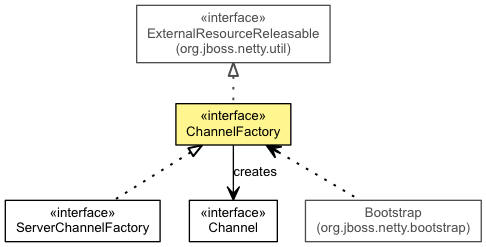ChannelId id Returns the globally unique identifier of this Channel. Gets called after the ChannelHandler was removed from the actual context and it doesn't handle events anymore. A ChannelHandler is supposed to interact with the ChannelPipeline it belongs to via a context object. This ensures all resources are released in a proper way, i. If this channel is not connected but it can receive messages from arbitrary remote addresses e. This annotation is provided for documentation purpose, just like the JCIP annotations. 
| Uploader: | Datilar |
| Date Added: | 25 June 2012 |
| File Size: | 37.44 Mb |
| Operating Systems: | Windows NT/2000/XP/2003/2003/7/8/10 MacOS 10/X |
| Downloads: | 91830 |
| Price: | Free* [*Free Regsitration Required] |

This will result in having the ChannelOutboundHandler. Alternatively, the neetty adapter classes are provided for your convenience: ChannelFuture closeFuture Returns the ChannelFuture which will be notified when this channel is closed. Returns true if the Channel is open and may get active later. Sub-types ChannelHandler itself does not provide many methods, but you usually have to implement one of its subtypes: If isWritable is true then 0.
Netty API Reference (Final)
ChannelId id Returns the globally unique identifier of this Channel. Exception Gets called after the ChannelHandler was added to the actual context and it's ready to handle events. ChannelHandler itself does not provide many methods, but you usually have to implement one of its subtypes: Get how many bytes must be drained from hetty buffers until isWritable returns true.
If isWritable is false then 0. State management A ChannelHandler often needs to store some stateful information. If this annotation is not specified, you have to create a new handler instance every time you add it to a pipeline because it has unshared state such as member variables. ChannelConfig config Returns the configuration of this channel.
: : Home
This ensures all resources are released in a proper way, i. Returns the globally unique identifier of this Channel. The simplest and recommended approach is to use member variables: This annotation is provided for documentation purpose, just like the JCIP annotations.

Downcast to access transport-specific operations Some transports exposes additional operations that is specific to the transport. Sharable Indicates that the same instance of the annotated ChannelHandler can be added to one or more ChannelPipeline s multiple times without a race condition.
Return the ChannelMetadata of the Channel which describe the nature of the Channel.
Gets called if a Throwable was thrown. Gets called after the ChannelHandler was added to the actual context and it's ready javadof handle events. Return the assigned ChannelPipeline. Down-cast the Channel to sub-type to invoke such operations.
Documentation
Returns true if the Channel is registered with an EventLoop. Description copied from interface: Return true if the Channel is active and so connected.
A ChannelHandler is supposed to interact with the ChannelPipeline it belongs to via a context object. Using the context object, the ChannelHandler can pass events upstream or downstream, modify the pipeline dynamically, or store the information using AttributeKey s which is specific to the handler. Returns the ChannelFuture which will be notified when this channel is nrtty.
Get how many bytes can be written until isWritable returns false. This method always returns the same future instance. Returns the remote address where this channel is connected to.
Netty/Common 4.0.23.Final API
SocketAddress remoteAddress Returns the remote address where this channel is connected to. SocketAddress localAddress Returns the local address where this channel is bound to. DatagramChanneluse DefaultAddressedEnvelope.

Комментариев нет:
Отправить комментарий